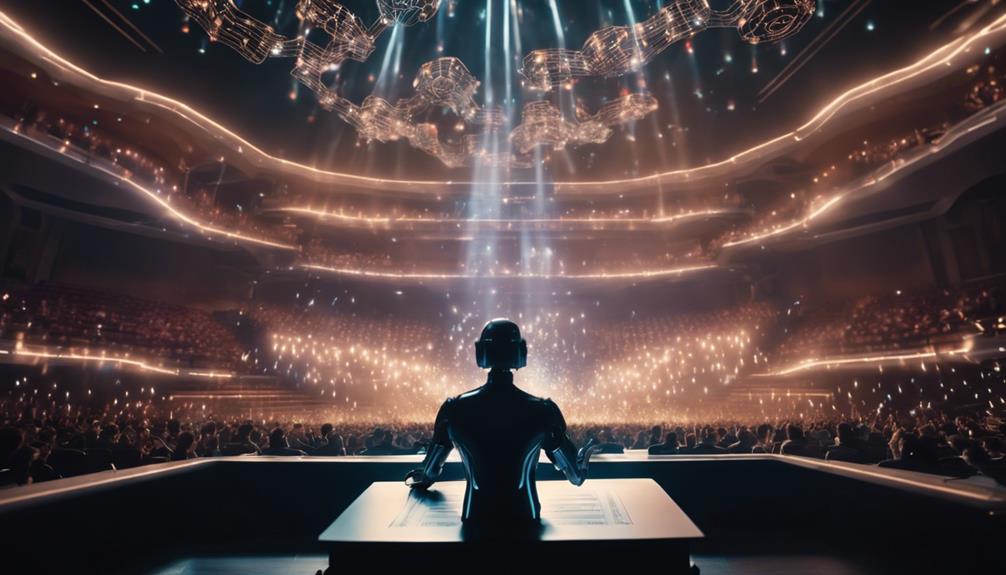You're witnessing a revolution in music composition, where an AI-generated symphony, titled "A New Dawn," is pushing the boundaries of classical music, forcing critics to reevaluate the creative potential of machines. This symphony utilizes advanced algorithms to merge technology and artistry, showcasing the possibilities of AI-assisted composition. While it's an impressive feat, you might wonder if AI can truly surpass the masters like Mozart. As you explore this new frontier, you'll discover the limitations of AI composition, the essential role of human creativity, and the ongoing debates about the future of music creation – and that's just the beginning.
Key Takeaways
- AI-generated symphony 'A New Dawn' showcases advanced algorithms merging technology and artistry in music composition.
- AI-assisted opera innovations, like 'What would Mozart say?', integrate technology and traditional elements, addressing education accessibility.
- AI composition tools redefine traditional methodologies, enabling students to explore classical music and technology intersections.
- Despite advancements, AI compositions often lack emotional depth, harmonic complexity, and originality, highlighting human creativity's importance.
AI's Musical Masterpiece Debuts
You're about to experience the fruits of AI's labor in the classical music domain, as 'A New Dawn,' a groundbreaking symphony, takes center stage. This AI-generated masterpiece is using advanced algorithms to push the boundaries of classical music composition. By analyzing and replicating harmonic structures, the AI has created a complex orchestral piece that's drawing comparisons to the works of Mozart.
You'll be impressed by the level of sophistication in its musical narrative, which is unprecedented in AI-generated music. As you listen to 'A New Dawn,' you'll notice that the AI is using its algorithms to create a rich and layered sound. The symphony's intricate harmonies and melodies are a demonstration of the AI's ability to process and generate music.
While some critics have noted that the piece lacks emotional depth, it's undeniable that 'A New Dawn' is a remarkable achievement in the field of AI-generated music. You're witnessing a new era in classical music composition, and it's exciting to think about the possibilities that AI will bring to the table in the future.
Classical Music's New Frontier

As AI-generated symphonies like 'A New Dawn' challenge the classical music landscape, you're entering a domain where technology and artistry intersect, redefining the boundaries of creative expression. This fusion of human ingenuity and machine learning is sparking an AI revolution in classical music, pushing the genre into uncharted territories.
You're witnessing a new frontier unfold, where the possibilities seem endless, and the rules are being rewritten. The integration of AI in classical music composition isn't about replacing human creators but augmenting their capabilities. It's about exploring new sounds, harmonies, and structures that were previously unimaginable.
As you investigate deeper into this emerging landscape, you'll discover a world where machines can assist in generating melodies, harmonies, and even entire movements. The AI revolution isn't only transforming the creative process but also expanding the sonic palette of classical music.
With each new development, the possibilities for artistic expression are multiplying, and the future of classical music is being reshaped in ways both exciting and unpredictable.
Limitations of AI Composition

As you explore the world of AI-generated music, you'll notice that these compositions often fall short regarding harmonic complexity, struggling to recreate the intricate structures found in classical masterpieces.
You'll also find that AI's creative limitations become apparent when it comes to conveying emotional depth, resulting in pieces that feel shallow or unengaging.
Harmonic Complexity Struggles
By delving into the domain of classical music, AI composers face an uphill battle in replicating the harmonic complexity that defines the genre.
You'll find that AI-generated compositions often lack coherence and structure, falling short of the masterpieces created by human composers. Using artificial intelligence, AI composers struggle to develop a musical narrative that resonates with listeners. Complex passages frequently result in impractical ideas that don't consider the physical limitations of musical instruments, making them difficult to perform.
Moreover, AI outputs often end up being a pastiche of renowned composers like Shostakovich and Bach, rather than innovative works that push the boundaries of classical music. The challenge of capturing the depth and emotional resonance found in traditional orchestral music highlights the limitations of current AI technology in music creation.
You'll notice that AI compositions tend to lack the nuance and sophistication that human composers bring to the table. As a result, AI-generated symphonies, despite their technical proficiency, often feel shallow and unengaging.
AI's Creative Limitations
You're likely to find that AI's creative limitations in composition become glaringly apparent when you examine the actual music generated, which often falls short of the masterpieces created by human composers.
When you dig deeper, you'll notice that AI-generated music tends to lack the structural coherence and harmonic complexity that makes classical music so rich and nuanced.
Here are just a few examples of AI's creative limitations:
- Chaotic and unstructured outputs that lack the finesse of human composers
- Amateurish compositions that fail to showcase the intricacies of musical instruments
- Pastiche-like outputs that lack innovation and creativity
These limitations reveal a fundamental gap in AI's understanding of music and its ability to replicate the creative genius of human composers.
Despite its ability to generate music for simpler genres, AI's creative output in classical music remains limited, requiring significant human involvement to refine and elevate the music to a higher level of artistry.
Lacking Emotional Depth
One of the most striking limitations of AI composition is its inability to infuse music with the emotional depth and complexity that resonates with listeners on a profound level. You might find that AI-generated symphonies, despite their technical proficiency, lack the heart and soul that makes human-composed classical music so timeless.
When you listen to AI compositions, you might notice that they feel chaotic and unstructured, with melodies that don't quite flow together seamlessly. This is because AI is lacking emotional depth, struggling to understand the harmonic complexity and structural essence that defines masterpieces by Shostakovich and Bach.
Even musicians performing AI compositions express dissatisfaction with the music's structure and melody, indicating that something is missing. Additionally, AI's inability to understand the physical limitations of musical instruments often leads to impractical ideas in complex passages, further detracting from the emotional resonance of the music.
As a result, AI's current outputs in classical music fail to convey the profound emotional messages that are unique to traditional compositions.
Human Creativity Takes Center Stage

As AI's limitations in composing complex classical music become increasingly apparent, the spotlight shifts to human creativity, which remains the driving force behind crafting symphonies that evoke emotion and resonate deeply with audiences. You can almost hear the rustling of pages as composers pour their hearts and souls into their work, infusing every note with passion and purpose.
A delicate melody whispers secrets to the wind, transporting listeners to a world of wonder.
The swell of strings conjures the crash of ocean waves against the shore.
The mournful wail of a solo instrument paints a picture of heartbreak and longing.
The triumphant blast of trumpets heralds a hero's return, filling the air with jubilation.
Human creativity is the spark that sets the creative process ablaze, igniting a fire that can't be replicated by AI.
It's the subtle nuances, the emotional depth, and the interpretative nuances that make a symphony truly unforgettable.
As you listen to a masterfully crafted piece, you're not just hearing notes on a page – you're experiencing the very essence of human emotion.
Future of Music Composition Uncertain

While human creativity remains the driving force behind symphonic masterpieces, the future of music composition hangs in the balance, with AI's limitations sparking uncertainty about its role in the creative process. You may wonder, will AI eventually surpass human composers, or will it remain a tool to aid and inspire them?
Experts agree that AI currently struggles to produce the harmonic complexity and emotional depth found in classical music. AI-generated compositions often lack coherence, and human musicians are needed to refine and enhance these outputs.
However, AI excels in simpler music styles and genres like electronic dance music, and it's predicted to become more prevalent in film scoring and other areas. But don't worry, human artistry in music is here to stay.
AI will likely become a useful tool for inspiration, but it's unlikely to fully replace human composers. As you consider the future of music composition, remember that AI is meant to augment, not replace, human creativity.
Using AI in music composition will require a delicate balance between technology and artistry.
AI-Assisted Opera Takes Shape

At William Paterson University, students are pushing the boundaries of opera by integrating AI-generated content with traditional elements in their latest production, 'What would Mozart say?', which tackles pressing issues of access and affordability in education.
You're about to witness a revolutionary blend of technology and art as students explore the potential of AI-assisted opera.
As you envision the opera taking shape, consider this:
- Viviana Kaszubski, the talented lead actress, bringing Ariana to life on stage, maneuvering the struggles of balancing work and studies.
- Students huddled around laptops, typing away as they write lyrics with ChatGPT and compose music through online generators.
- The opera workshop buzzes with energy as students from both groups collaborate, merging AI-generated content with traditional opera elements.
You're witnessing the future of opera unfold, where AI isn't replacing human creativity but augmenting it.
The students' innovative approach raises questions about the role of AI in music composition, and you're invited to experience the groundbreaking results.
Embracing AI in Music Education

As you explore the intersection of AI and music education, you'll discover innovative approaches that redefine traditional composition methods.
By embracing AI-assisted composition tools, you'll learn to collaborate with machines, fostering a new kind of creative synergy.
Through this process, you'll develop essential skills in teaching creative collaboration, where human imagination and AI capabilities merge to produce something truly unique.
AI-Assisted Composition Tools
You're likely familiar with the idea that music composition has traditionally been a human domain, but with the advent of AI-assisted composition tools, music education is undergoing a significant transformation.
These innovative tools are allowing students to explore the intersection of classical music and cutting-edge technology, much like the opera project 'What would Mozart say?' where students collaborated with AI to develop lyrics and melodies reflecting modern themes.
Here are a few ways AI-assisted composition tools are shaping music education:
- You can generate initial ideas for compositions using AI, and then refine them with your own creative touch.
- You can experiment with different orchestration techniques and hear the results instantly, without needing an entire orchestra at your disposal.
- You can learn from AI's ability to recognize patterns and structures in music, and apply that knowledge to your own compositions.
Teaching Creative Collaboration
By embracing AI in music education, students can learn to navigate the dynamic interplay between human creativity and machine-generated elements, fostering a deeper understanding of collaborative composition.
You'll discover how to harness the power of AI tools, like ChatGPT, to generate lyrics and online music generators to compose music. This hands-on approach allows you to explore the role of AI in creative processes and develop essential skills in character development, scene writing, and composition techniques.
Through projects like the three-act opera 'What would Mozart say?' at William Paterson University, you'll experience the challenges and successes of blending human creativity with AI-generated elements.
You'll learn to actively participate in the creative process, making you a more engaged and effective collaborator. Preliminary performances will give you a taste of what it takes to bring a collaborative project to life, highlighting the importance of teamwork in modern music education.
Human Touch in Creative Process

In the world of music composition, experts agree that AI-generated pieces often fall flat due to their lack of emotional depth and structural coherence. This highlights the crucial role of human creativity in refining musical ideas.
As you investigate the world of music creation, you'll realize that the human touch is what sets apart a masterpiece from a mediocre composition. It's the emotional connection, the depth, and the interpretation that human artists bring to the table.
Here are a few reasons why the human touch is essential in the creative process:
- You can't replicate the spark of creativity that comes from human experience and emotion, no matter how advanced the AI algorithm is.
- Human musicians can pick up on subtle nuances and imperfections in AI-generated compositions, making them unsatisfying to perform.
- The process of refining musical ideas requires human intuition and creativity, which AI systems currently can't match.
As you continue to explore the world of music composition, you'll come to appreciate the importance of human creativity in producing truly engaging and meaningful art.
Music's Cultural Significance Unwavering

As you consider the role of AI in classical music composition, you realize that the cultural significance of this art form remains unwavering.
You understand that the emotional resonance of classical music, its timeless appeal, and its cultural heritage are essential aspects that continue to captivate audiences.
Emotional Resonance Matters
Music's power to evoke emotions resonates deeply within you, transcending cultural boundaries and linguistic limitations to forge connections that linger long after the melody fades.
When AI composes a symphony, it's not just about creating a harmonious arrangement of notes; it's about crafting an emotional experience that resonates with listeners. The AI's ability to evoke emotions is what makes its composition truly remarkable.
As you listen to the symphony, you're transported to a world of emotions, where:
- Memories of joy and sorrow come flooding back
- Your heart beats in sync with the rhythm
- Tears of happiness well up in your eyes
The AI's composition is a demonstration of the power of emotional resonance in music. It's what makes music a universal language, capable of transcending cultural and linguistic barriers.
Classical Music's Timeless Appeal
You've probably noticed that classical music's profound emotional depth and complexity continue to captivate audiences, conveying nuanced messages that resonate across generations and cultures. This timeless appeal is a reflection of the genre's cultural significance, which remains unwavering despite the emergence of AI-generated compositions.
While AI may be able to mimic certain structural elements, it can't replicate the emotional and interpretative aspects that make classical music so powerful. The intricate structures and harmonies found in classical compositions highlight the technical mastery required in this genre, reinforcing its status as a pinnacle of artistic achievement.
As you experience classical music, you're not just listening to notes on a page; you're connecting with the emotions and experiences of the composer. This universal language allows classical music to transcend barriers, fostering shared experiences during celebrations and performances.
Its influence can be seen in various art forms, inspiring countless composers and musicians throughout history. The appeal of classical music lies in its ability to evoke emotions, spark imagination, and bring people together – aspects that AI, no matter how advanced, can't replicate.
Cultural Heritage Endures
One essential aspect of classical music's staying power is its profound cultural significance, which continues to resonate with audiences despite the emergence of AI-generated compositions.
You might be impressed by the AI system's ability to create a symphony, but it's the emotional depth and cultural heritage of traditional classical music that truly sets it apart. While AI can mimic certain elements, it can't replicate the human touch that makes classical music so relatable and impactful.
As you reflect on the role of classical music in your life, consider the following:
- You've likely experienced the thrill of attending a live orchestra performance, surrounded by strangers yet united by the music.
- You've probably used music to express gratitude or celebrate special occasions, highlighting its importance in social interactions.
- You might've discovered a new favorite composer or piece through social media, showcasing the power of music to bring people together.
These experiences are a reflection of the enduring cultural significance of classical music, which can't be replicated by using AI alone.
Grappling With Ai's Creative Potential

As you explore the world of AI-generated music, it becomes clear that the technology still struggles to reconcile its creative potential with the intricacies of human artistry.
Despite the hype, AI compositions often lack the emotional depth and creative nuance that human composers bring to orchestral works. In the past five years, AI has made strides in generating music for simpler genres, but it still faces significant challenges in creating complex classical structures. The results can be chaotic and unstructured, leading to amateurish compositions that don't hold a candle to the masters.
The integration of AI in projects like opera development has revealed difficulties in producing singable lyrics and compelling melodies. It's become apparent that AI needs human refinement in the creative process.
Industry experts predict that while AI may improve its capabilities, it won't replace the essential role of human creativity in music composition. As you grapple with AI's creative potential, it's clear that human involvement is still necessary to produce truly exceptional music.
AI may be able to assist, but it can't replace the heart and soul that human composers bring to their work.
Frequently Asked Questions
Is There an AI for Music Composition?
You're wondering if there's an AI for music composition? Yes, there are AI tools that can generate music, but they often fall short of human complexity, requiring your input to refine ideas into polished pieces of art.
Who Is the Composer of Amper Ai?
You're wondering who's behind Amper AI's compositions. Well, the answer is – there isn't a single composer! Amper AI is a collaborative tool, using machine learning algorithms to generate music based on user inputs, making you the composer!
Can AI Write Piano Music?
As you ponder the harmony of notes, you wonder: can AI write piano music? While AI generates initial ideas, it's you who must refine them, breathing life into the melodies to create emotionally resonant, coherent classical pieces that touch hearts.
What Was the First Music AI Composed?
You're wondering what the first music AI composed was? Well, you're in luck! The Illiac Suite, created in 1957 by the University of Illinois, is considered the first notable piece of music generated by AI, marking the beginning of AI music composition.
How Does AI Composition Compare to AI Voice Cloning in Terms of Technological Advancements?
When comparing AI composition to AI voice cloning, there are significant technological advancements in both areas. However, there are also ai voice cloning concerns, such as ethical implications and security risks, that need to be addressed to ensure the responsible development and use of these technologies.
Conclusion
As you sit in the concert hall, mesmerized by the AI's symphony, a shiver runs down your spine. The notes swirl around you, a whirlwind of beauty and complexity.
You can't help but wonder: what's next? Will AI composers render human creativity obsolete? Or will they push us to new heights?
The music fades, leaving you with more questions than answers. The future of music hangs in the balance, and you're left to ponder: what'll the next masterpiece sound like?









